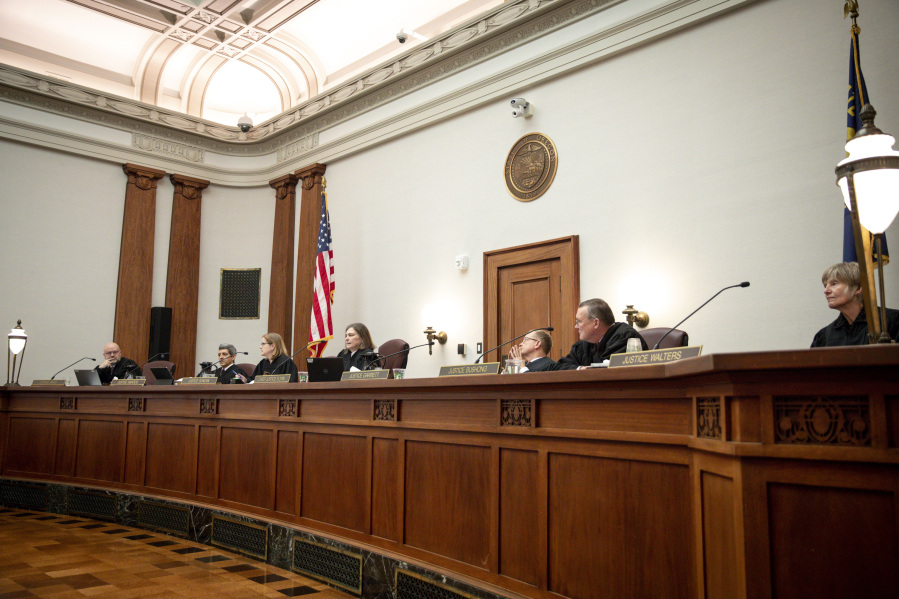SALEM, Ore. — The Oregon Supreme Court heard oral arguments Thursday in a lawsuit filed by Republican state senators who boycotted the Legislature for a record six weeks earlier this year and want to run for reelection despite a voter-approved constitutional amendment aimed at limiting walkouts.
The GOP senators, including Senate Minority Leader Tim Knopp, are challenging the Oregon Secretary of State’s interpretation of the amendment. Passed by voters by a wide margin in 2022, Measure 113 amended the state constitution to bar lawmakers from reelection if they have 10 or more unexcused absences.
Each of the five state senators who filed suit — Sens. Tim Knopp, Daniel Bonham, Suzanne Weber, Dennis Linthicum and Lynn Findley — racked up more than 10 absences during the walkout that ground the 2023 legislative session to a halt. The longest in the Legislature’s history, the boycott stalled hundreds of bills and made national headlines.
Before the Oregon Supreme Court in the state capital of Salem, justices Thursday questioned the attorneys for both sides as they wrangled over the grammar and syntax of the language that was added to the state constitution after voters passed Measure 113.
The amendment says a lawmaker is not allowed to run “for the term following the election after the member’s current term is completed.” The senators claim the amendment as written means they can seek another term, since a senator’s term ends in January while elections are held the previous November. They argue the penalty doesn’t take effect immediately, but rather, after they’ve served another term.
The two sides also wrestled with the slight differences in wording that appeared on the actual ballot that voters filled out and the text of the measure as included in the voters’ pamphlet.
The ballot said the result of a vote in favor of the measure would disqualify legislators with 10 or more unexcused absences from holding office for the “term following current term of office.” It did not include the word “election,” as the text of the measure that appeared in the pamphlet did. What appeared in the pamphlet was ultimately added to the state constitution.
Because of this, Dustin Buehler, the attorney from Oregon’s justice department representing the secretary of state, argued that in casting a yes vote support of the measure, voters intended that legislators with that many absences be barred from running after their current term is up.
“The intent is crystal clear,” said Dustin Buehler, attorney in charge of civil appeals at the Oren Department of Justice. “The ballot title caption, for example, which appeared literally right above the ‘yes’ and ‘no’ bubbles that voters fill in on their ballot was unambiguously clear.”
John DiLorenzo, an attorney representing the senators, disputed this.
“Last I checked, the ballot titles are not added to the constitution,” he said. The ballot titles were “just explanatory tools,” he added. “And you know what? They were wrong.”
The senators’ lawsuit was filed against Secretary of State LaVonne Griffin-Valade, who earlier this year said the boycotting senators were disqualified from seeking reelection in 2024. She directed her office’s elections division to implement an administrative rule to clarify the stance.
Griffin-Valade and state officials say the rule reflected the intent of voters when they approved the measure last year.
All parties in the suit are seeking clarity on the issue before the March 2024 filing deadline for candidates who want to run in next year’s election.
State Sen. Tim Knopp said he and his fellow plaintiffs were happy they got their day in court before the justices.
“We’re not arguing over semantics. We’re arguing over the plain language of a measure,” he told reporters after Thursday’s oral arguments.
“If you don’t support the plain language of what the constitution actually says,” he added, “then you’re left with complete interpretation of intent after the fact.”
In total, 10 Republican state senators had more than 10 unexcused absences during the 2023 walkout, which stemmed from bills on abortion, transgender health care and guns.
Oregon voters approved the ballot measure that created the amendment following Republican walkouts in the Legislature in 2019, 2020 and 2021.



